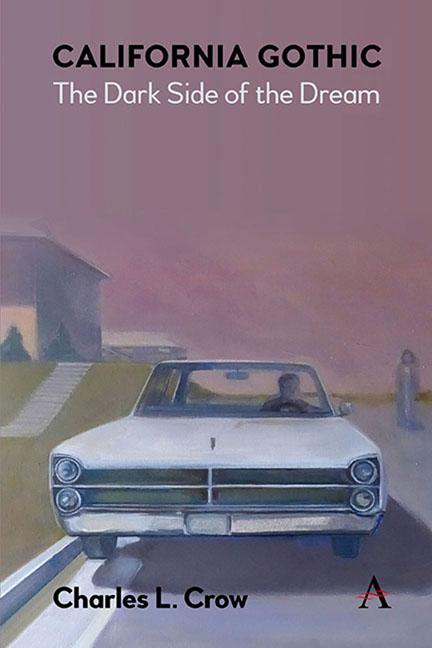Book contents
- Frontmatter
- Dedication
- Contents
- List of Figures
- Preface
- Acknowledgements
- 1 The Magic Island
- 2 Ambrose Bierce and San Francisco’s Gothic Frontier
- 3 Lost Coasts
- 4 Disease, Pandemics, and the Monstrous
- 5 The Shadow Line: Noir and California Gothic
- 6 California Ecogothic: What’s Buried in the Basement
- Works Cited
- Afterword
- Index
Afterword
Published online by Cambridge University Press: 27 March 2024
- Frontmatter
- Dedication
- Contents
- List of Figures
- Preface
- Acknowledgements
- 1 The Magic Island
- 2 Ambrose Bierce and San Francisco’s Gothic Frontier
- 3 Lost Coasts
- 4 Disease, Pandemics, and the Monstrous
- 5 The Shadow Line: Noir and California Gothic
- 6 California Ecogothic: What’s Buried in the Basement
- Works Cited
- Afterword
- Index
Summary
Facing west from California’s shores, Walt Whitman asked, “But where is what I started for so long ago, and why is it yet unfound? (p. 267). Unable to answer these questions, Californians have remade their state again and again. At times it has seemed complete, as, for example, in 1940, when according to Kevin Starr (1940–2017), its network of new roads and bridges and a water supply adequate for a maturing California made it “a unity achieved by public works.” (Endangered, p. 339).
Then again, the world rushed in during WWII, unmaking and remaking everything. More recently, the tech industry of Silicon Valley created tens of thousands of new jobs, changing not only the state’s but the nation’s economy, as completely as did the California gold rush.
And still, as scholars Katarzyna Nowak-McNeice and Agata Zarzyka recently observed, “California does not make sense” (p. 3). A flippant response would be that it must make pretty good sense for the forty million citizens who have chosen to live here and who have built an economy that is the fourth or fifth largest in the world.
Nowak-McNeice and Zarzycka have a point, however. The narrative that we Californians tell ourselves, as the above chapters have tried to show, has been constructed by suppressing much of the story. The California dream, in its various evolutions, is maintained by omission and forgetting. What is repressed or ignored returns in the California Gothic. Yet it would be a mistake to make California a scapegoat for all that is wrong in the United States or the world. Jeremiads about the failure of California, often with pictures of the homeless in San Francisco, Oakland, and Los Angeles, can be read in the media every day and are themselves willful suppressions of shared national shortcomings. Some sixty years ago, Wallace Stegner summed up the dynamic between California and the rest of the nation thus: “Like the rest of America, California is unformed, innovative, ahistorical, hedonistic, acquisitive, and energetic, only more so.” (p. 28). The quotation is often given in an abbreviated form, in a way that stresses the difference between California and the rest of the country: California exaggerates, is extreme. The full passage, with its catalog of shared qualities, indicates the common ground: not different, only intensified.
- Type
- Chapter
- Information
- California GothicThe Dark Side of the Dream, pp. 71 - 72Publisher: Anthem PressPrint publication year: 2024

